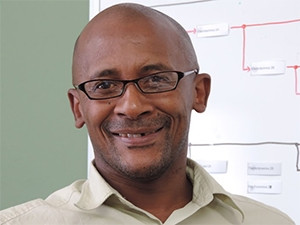
The University of Johannesburg (UJ) will open the first Institute for Intelligent Systems (IIS) in January 2016, to solve complex challenges in society and industry where big data is available.
Located at the university's Auckland Park Kingsway campus, the institute will form partnerships with industry, government and communities to resolve challenges for the economic benefit of the country.
"Africa is a rapidly growing continent, presenting huge opportunities, challenges and complex problems that can be tackled with intelligent systems, but most of this kind of expertise is still developed outside the continent.
"This is a good time to establish the first world-class institute for systems intelligence and related multi-disciplinary research centres and facilities in Africa," says institute director, professor Bhekisipho Twala.
Bigger purpose
As the first university both locally and on the continent to establish such an institute, UJ wants to use systems intelligence to deal with everyday societal challenges.
Twala says: "We will confront complex challenges in society and industry where big data is available on the African continent and in Brazil, Russia, India, China and South Africa (BRICS) countries, with the design and implementation of intelligent systems capable of learning and improving their own processes for the economic benefit and sustainable growth of diverse stakeholders.
"Some big challenges in society and industry, such as fraud prevention or better water resource management, can be addressed much more effectively with the combination of big data and intelligent systems designed to analyse and act on that data.
"By developing African expertise in Africa, we ensure the sustainable development of expertise for our continent's future," says Twala.
In terms of research, the institute will focus on pure research, developing patents and delivering solutions to industry for significant return on capital employed.
The ISS will also collaborate with international centres, such as the IEEE Community of Intelligent Systems, and the Korean Institute for Intelligent Systems.
Veteran leader
Under the direction of Twala, who serves as head of the Department of Electrical and Electronic Engineering Science at UJ, the institute wants to develop pioneering researchers, engineers, scientists and academics from various disciplines in intelligent systems.
From 2010 to 2013, Twala was professor in artificial intelligence and statistical science.
Twala's extensive experience in the industry also includes a period as an advisor at the Council for Scientific and Industrial Research from 2008 to 2012.
His industry experience includes managing the methodology section for a labour force survey re-engineering project for Statistics South Africa, and consulting on a project at London Imperial College addressing the impact of HIV/AIDS on education systems in developing countries.
Twala also served as CTO for the Ministry of Public Works and Transport in Swaziland, managing road transport statistics, technical aspects of vehicles, vehicle operating costs, road transport legislation and the enforcement of such legislation.
Quality workforce
The IIS will recruit a multi-disciplinary team of highly-qualified scientists and engineers from UJ and industry, ranging from computer science, health sciences, management and accounting.
Twala says the institute will recruit students not only from South Africa but also other African nations, as well as BRICS countries.
"We're in the process of recruiting for the academic programme and research staff," says Twala.
"The institute will recruit post-graduate students for the first intake of 2017, followed thereafter by undergraduate degrees in disciplines such as intelligent systems, cloud computing, bio-informatics, and computational biology."
Looking ahead
According to Twala, there are lots of plans in the pipeline for the institute.
In the next year, it plans to establish a cognitive computing centre and research in collaboration with a global industry player, he says.
"By 2018, we aim to establish a centre of expertise within the IIS for intelligent telecommunication; the following year in intelligent freight logistics and transportation. After that, we're looking at intelligent water, environment management and renewable energy."
Share